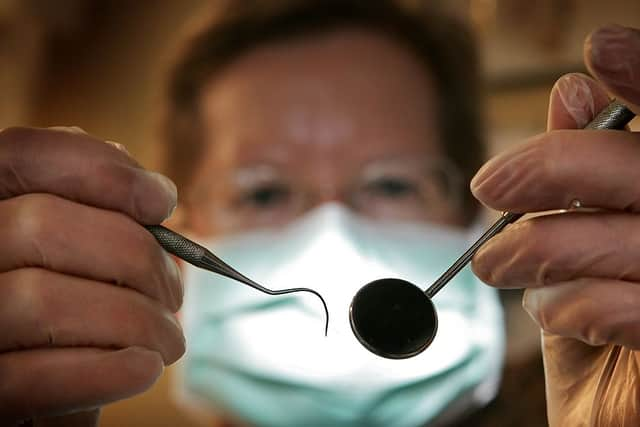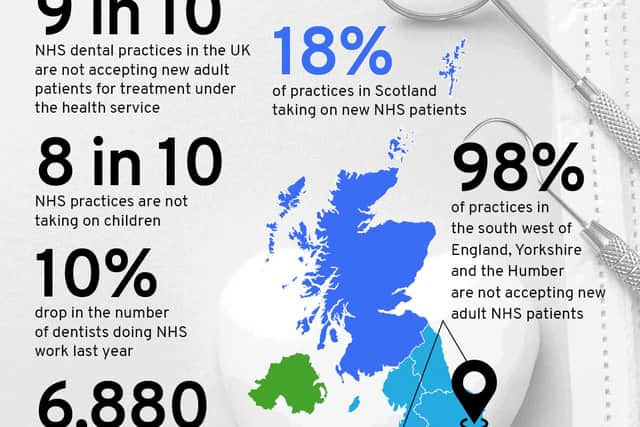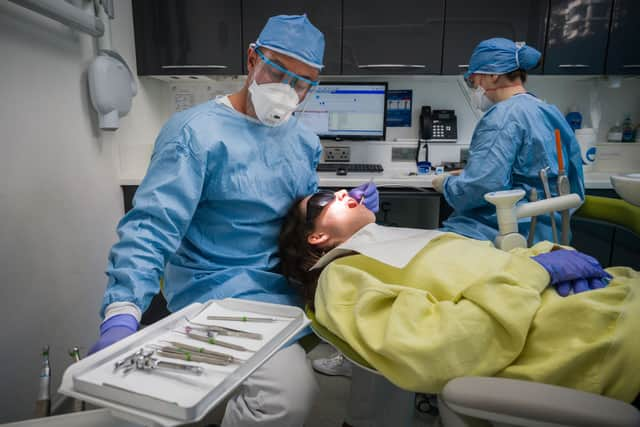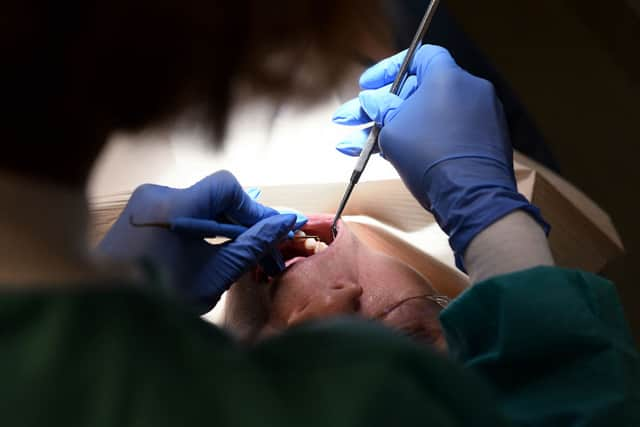How much do dentists earn? UK average salary for a dentist explained - and difference in NHS and private pay
and live on Freeview channel 276
A shocking new analysis has found the majority of NHS dentists across the UK are not accepting new patients.
The BBC research contacted 7,000 practices offering subsidised treatment and found dental surgeries in a third of the UK’s council areas were not taking on any new people.
Advertisement
Hide AdAdvertisement
Hide AdPart of the problem is believed to be down to how much private work dentists are taking on in the wake of a real-terms NHS pay cut.
So how much do dentists earn for NHS and private healthcare?
Here’s what you need to know.


How does dentistry pay work in UK?
While dentists work at dental practices, they tend to be self-employed and perform a mix of NHS and private work.
Dentistry in the UK has had a private sector since the 1950s, after the government moved it from being a free service to a subsidised one in 1951.
Advertisement
Hide AdAdvertisement
Hide AdThis also means the government doesn’t directly fund NHS dental care - only funding part of a dentist’s salary or a practice’s income rather than investing in any equipment or service.
NHS work tends to be viewed by practices as a gateway into getting patients to sign up for private treatments, such as non-urgent dental hygienist appointments, or cosmetic treatment.


Any NHS work they sign up for in England and Wales comes under a contract that defines a minimum number of ‘units of dental activity’ the dentist must complete in a 12-month period - a system that was introduced in 2006.
NHS England defines UDAs as a measure of how much dental work takes place rather than how many patients are treated.
Advertisement
Hide AdAdvertisement
Hide AdAs a rule of thumb, more complex treatments count towards more UDAs than simpler ones.
For example, a routine check up counts as 1 UDA, while dentures are worth 12 UDAs.
This system was marginally reformed in July 2022.


If the dentist and their practice don’t meet the contract’s UDA targets, they are financially penalised by the NHS.
But this system is unpopular among dentists, who disagree that a target-based approach incentivises the best treatment.
Advertisement
Hide AdAdvertisement
Hide AdThey also argue it does not accurately reflect the time and skill required for certain treatments, with extracting a tooth getting the same amount of UDAs as a complicated program of treatment to save it.
As well as these issues, the payments received from these contracts have remained broadly the same for the last decade, with the British Dental Association (BDA) describing the 2010s as a “lost decade” for the NHS dental system.
NHS figures for the 2019/20 financial year show the taxable income of high street dentists providing NHS care in England fell by nearly 40% in real terms over 10 years.
The picture is broadly the same in the other UK nations.


Meanwhile, a House of Commons research briefing published in July 2022 found the contribution of NHS England to the funding of dentistry services fell by 9% in real terms between 2010/11 and 2019/20.
Advertisement
Hide AdAdvertisement
Hide AdOver the same period income from patient charges - i.e. private appointments - increased by 17%, suggesting there’s been more of a shift towards private healthcare in recent years.
What is the average UK dentist salary?
NationalWorld has checked with several leading job search websites to find out the average dentist’s salary in the UK.
Glassdoor says the average basic salary sits at £54,072, while Indeed puts the figure at £75,092.
A survey of more than 800 dentists conducted by trade magazine Dentistry in late 2021 found the average range was £50,000 to £74,000, while 4% of respondents reported earnings of more than £200k per year.
Advertisement
Hide AdAdvertisement
Hide AdPay depends on how qualified, experienced and specialised the dentist is, with a newly-qualified NHS dentist undertaking professional training receiving £34,728 a year.
At the other end of the scale, a specialist consultant can take home an average of between £84,559 and £114,003 per year.
What is the difference between NHS and private dentistry pay?
There is no measure for how much NHS work pays in comparison to private dentistry.
Given the perception that private care tends to be more lucrative, you would think there would be a great disparity in earnings.


Advertisement
Hide AdAdvertisement
Hide AdHowever, when looking at the profits generated by practices a surprising picture emerges.
According to a recent report from the National Association of Specialist Dental Accountants and Lawyers (NASDAL), net profits for NHS practices were £145,498 in the 2020/21 financial year.
For private practices, they were £143,418.
While this does not necessarily mean salaries match these statistics, it suggests there is not a major disparity in what dentists earn for NHS and private work.
However, NASDAL predicted the NHS tally would fall back in its next set of figures.
Advertisement
Hide AdAdvertisement
Hide AdIndeed, Dentistry’s census revealed 73% of dentists anticipated doing less NHS dentistry in the next two years, while 84% anticipated doing more private dentistry in the next 12 months.
Comment Guidelines
National World encourages reader discussion on our stories. User feedback, insights and back-and-forth exchanges add a rich layer of context to reporting. Please review our Community Guidelines before commenting.
